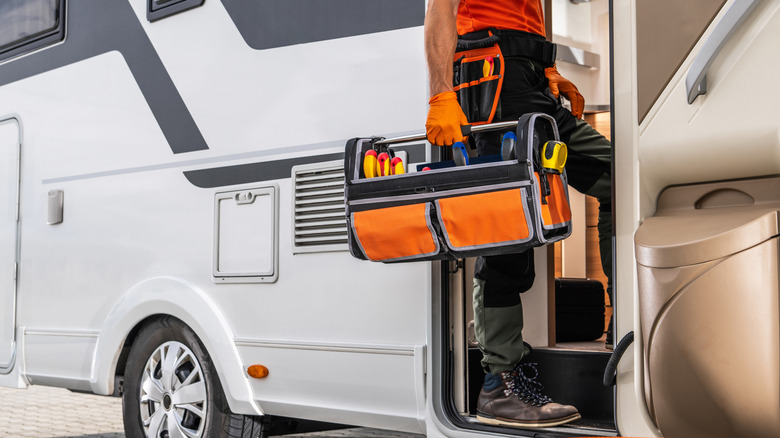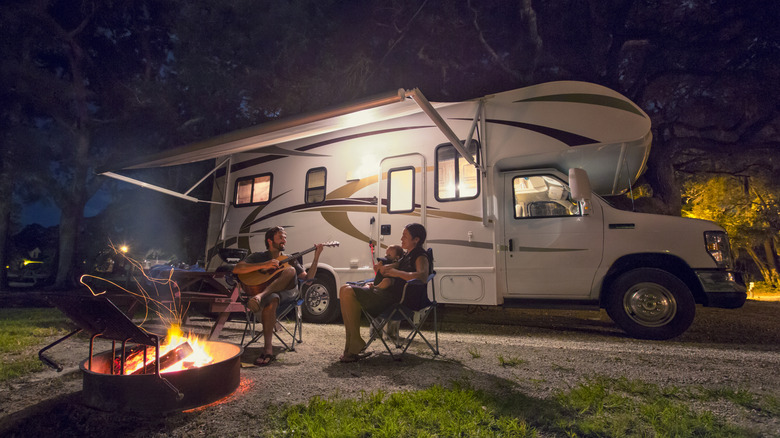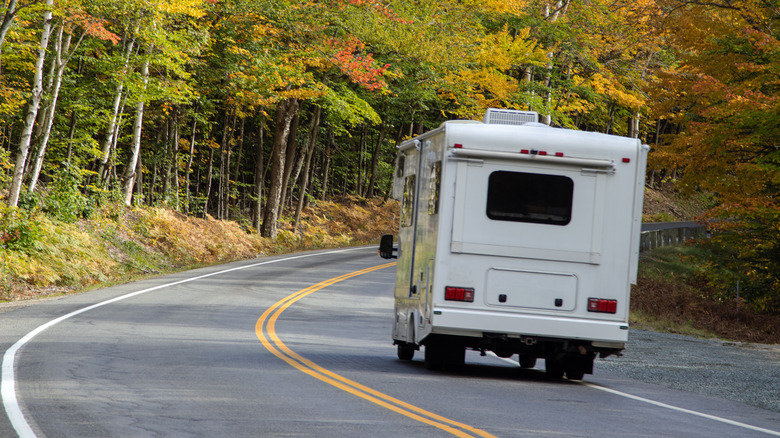The Popular Vehicle New Retirees Will Instantly Regret Buying
One of the most common "bucket list" aspirations of folks entering retirement is to travel. With no more work obligations and the kids out of the house, retirement is the perfect time to hit the open road and see our great nation from sea to shining sea. But instead of paying for hotel rooms or vacation rentals like Airbnb, what if you could take your accommodations with you?
Indeed, the freedom of being able to set up residence anywhere is a strong draw for retirees to purchase a recreational vehicle. Not to mention the comforts of home like a kitchen, and the convenience of not having to continually pack and unpack your clothing and other belongings. Some retirees might even flirt with selling their regular home to live on the road continuously.
However, owning a motorhome — a self-propelled recreation vehicle as opposed to a towable camping trailer — is not without certain shortcomings that you should be aware of. This being Money Digest, a major consideration is, of course, cost. Motorhomes can be as small as a "sprinter" cargo van or as large as a city bus, with a price range as varied as their size. Expect to spend anywhere from $50,000 to more than $1 million to purchase a new motorhome, depending on size, features, and luxury. But the costs don't stop there.
The purchase price is just the beginning
Besides the initial purchase price of a new motorhome — likely a six-figure sum — there's also insurance, maintenance, and fuel to consider. Not to mention that if you're obtaining a loan for your dream RV, the lender will charge interest. Most motorhomes also depreciate quite rapidly, which means that your purchase will lose a significant portion of its value the minute it's driven away from the dealership. Potential RV owners will also want to factor in the cost of maintenance, replacing wear items like brakes and tires, and any necessary repairs once your rig is no longer under warranty.
And then there's the cost of fuel to fill a motorhome's large tanks. It's true that many RVs use diesel engines, which are typically more fuel efficient than gasoline. Though the word "efficient" is relative when you're talking about something that weighs upwards of 10,000 pounds for a midsize Class C motorhome.
Though more efficient than gas, diesel fuel has been more expensive than gasoline is recent years, offsetting the potential energy savings. At the time of writing, the nationwide average price of diesel is $3.21 per gallon versus $2.93 per gallon for regular unleaded gas, per AAA. Motorhome owners will definitely want to brush up on tips and tricks to save money when buying fuel.
You'll need a place to park... home or away
Once you've splashed out on buying a motorhome, you might be aware that you may have to pay to camp inside it. According to RV rental company Cruise America, the average nightly cost to park an RV at a national park ranges from $25 to $60 per night. Longer-term RV parks are also available at a typical cost of $500 and $1,200 per month, depending on amenities, which can include fitness centers, swimming pools, and more.
Adding insult to injury, you could also be required to pay to store your RV somewhere when you're at home. For example, apartment dwellers or neighborhoods with an HOA that forbids them. The cost for storing your prize motorhome? About $90 to $200 per month.
For the thrifty types, note that free camping/parking does exist, albeit without water and electricity, on public lands and even in the parking lots of big box retailers like Walmart and Home Depot. Though you'll want to check policies with the store manager before setting up shop. Also, free sites don't have water and electrical hookups like many campgrounds and resorts. Therefore, you'll use a gas- or diesel-powered generator once the batteries run down and potentially need to refill onboard water tanks.
Definitely try renting first
While it's easy to point out the costliness and drawbacks of owning a motorhome, it definitely works for some folks. Many Americans, both retired and younger, enjoy the RV lifestyle and have owned one for many years. Just like with retirement investing, one-size-fits-all advice seldom works. With that in mind, consider renting a motorhome (or travel trailer, for that matter) to make sure you're suited to the lifestyle before you buy.
Fortunately, plenty of options exist. You can rent from large companies like Cruise America, as well as individual motorhome owners. For example, RVshare is sometime referred to as an "Airbnb-for-RVs." Finally, your local RV dealership may also have a selection of motorhomes and trailers to rent.
Besides the expense, perhaps you won't enjoy driving and maneuvering such a large vehicle. Or the labor that's involved with setting up camp, hooking up utility connections, and even having to pump out the toilet waste tank — yuck. Then again, even if you love your rental RV experience, it still might not be worth actually buying one. If you're only taking one or two trips per year, you could simply continue renting as required. For the ultimate in luxury, some RV rental providers will even transport your rolling residence to a campground for you and fully set it up, right down to stocking the refrigerator with groceries.



